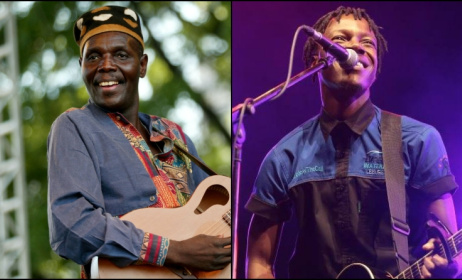Tuku and Bra Hugh: A friendship that will never be forgotten
Today, Africa remembers arguably two of the continent's greatest musicians, Hugh ‘Bra Hugh’ Masekela and Oliver ‘Tuku’ Mtukudzi, who died a year apart on 23 January 2018 and 2019, respectively. Tuku was accorded national hero status, making him the first musician to receive the recognition from the Zimbabwean government. As for Masekela, his family built a pavilion in his memory at Westpark Cemetery in Johannesburg, where he is buried.
 Oliver Mtukudzi and Hugh Masekela first met in Harare in the '80s.
Oliver Mtukudzi and Hugh Masekela first met in Harare in the '80s.
The two musicians achieved long and successful careers and enjoyed a close friendship that first blossomed when they shared the stage in Harare in the early 1980s. “I was performing at this small night club, and this guy came unlawfully on my stage and started blowing his trumpet,” Mtukudzi said at Masekela’s memorial in 2018. “I don't like people who disturb my choreography … I was performing ‘Ziwere’ and I remember he played very well.”
At the time, Mtukudzi did not know who the trumpeter was, but the two musicians were later formally introduced to each other, marking the start of a long friendship. “For over 30 years since I first discovered him, he never stopped to amaze me,” Masekela told the BBC in 2015. “[Our] synergy comes from the fact that we draw our sources and resources from heritage … We happen to come from the same rural beginnings, and as a result, we fall easily into each other’s music.”
The two friends last performed together in Harare in 2017, and their last joint recording was of ‘Tapera’ – a downtempo guitar-trumpet conversation between the two greats. The song was from Masekela’s last album No Borders. Their passing saw an outpouring of tributes from around the globe, with many praising their musicianship and artistic effervescence.
They were revered by their colleagues and provided unsurpassed inspiration to a new generation of musicians. Mtukudzi’s Pakare Paye Arts Centre, established in 2004, is synonymous with arts development and the nurturing of young musicians. Tuku was known for taking many upcoming talents under his wing, including saxophonist Joseph Chinouriri. “I was lucky to have worked with him for about five years,” Chinouriri said. “It's incredible that he gave me time and mentorship from home in Harare where I lived. That’s how special Tuku was. There is no doubt that his legacy will shine on, for many generations to come.”
Tuku’s former bassist, Never Mpofu, says it’s imperative to have more art centres that “strictly address upcoming musicians … Unfortunately, some of these initiatives are self-funded, forcing young musicians to lose their main focus. African governments must come on board here to lend that vital support to these institutions.”
Mpofu says Mtukudzi and Masekela’s legacies are based on their propensity to create hybrid sounds from new and old music. Masekela's style was a fusion of African rhythmic patterns with Western swing and jazz, while Mtukudzi created Tuku music – a coalescence of jazz and jiti. Aside from his husky voice and onstage charisma, he showcased a mastery of multiple languages.
The self-exiled Masekela kept the freedom torch ablaze globally while fighting apartheid through his music and mobilising international support to raise awareness about the South African autocratic state pre-1994. Mtukudzi, meanwhile, boldly reflected his views on society, but avoided direct political controversy. Nonetheless, when politics dominated the social discourse in his country, songs such as ‘Ndipeiwo Zano’, ‘Neria’, ‘Todii’ and 'Street Kid’ offered Zimbabweans hope for the future.
“These songs allow the younger generations to look back into their past to better forge their futures,” Zimbabwean rapper and activist Outspoken says. “Music has always found itself interwoven in the DNA of the people to inspire hope, spark defiance, communicate emotion and teach in a way that the spirit leads the conversation – the heart intently listens and the mind reimagines things it already knew.”
Mpofu says Mtukudzi's lyrics told multilayered stories with subtle melodies to evoke the correct emotional responses from listeners. “One of my best memories of Tuku’s musicianship was how he always took time with his compositions. No matter how busy things got, he allocated time to do things right because he wanted the work to be well done before releasing.”
Mpofu joined Mtukudzi’s Black Spirits band in 2000 and recorded albums like Vhunze Moto, Nhava, Tsivo, Tsimba Itsoka, Rudaviro and Dairai. “This was the most significant period in my career in terms of touring, in which we did both nationally, continentally and internationally. The experience alone was quite overwhelming; meeting and living among people from different cultural backgrounds, raising our national flag out there and being appreciated,” Mpofu says.
The confidence that Masekela and Mtukudzi had in their musical abilities, culture and heritage was unwavering. The two composed music to justify their artistic and intellectual prowess, and their legacy will remain unchallenged for decades to come.


































Comments
Log in or register to post comments